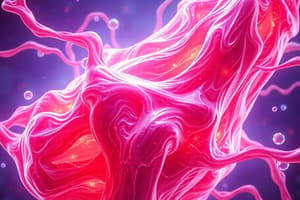Podcast
Questions and Answers
Which of the following are properties of muscle tissue? (Select all that apply)
Which of the following are properties of muscle tissue? (Select all that apply)
- Extensibility (correct)
- Elasticity (correct)
- Excitability (correct)
- Flexibility
What type of muscle is known for being under conscious control?
What type of muscle is known for being under conscious control?
Skeletal muscle
Cardiac muscle cells are typically multinucleate.
Cardiac muscle cells are typically multinucleate.
False (B)
What are the specialized cells in muscle tissue called?
What are the specialized cells in muscle tissue called?
Cardiac muscle is primarily found in the _____ of the heart.
Cardiac muscle is primarily found in the _____ of the heart.
Which muscle type is commonly found in the walls of tubular structures?
Which muscle type is commonly found in the walls of tubular structures?
What type of muscle tissue has a striated appearance?
What type of muscle tissue has a striated appearance?
Skeletal muscle cells are often referred to as _____ due to their extensive length.
Skeletal muscle cells are often referred to as _____ due to their extensive length.
Match the following types of muscle with their primary control type:
Match the following types of muscle with their primary control type:
Study Notes
Muscle Tissue Properties
- Muscle tissue is excitable, contractible, extensible, and elastic
- Excitability refers to the ability to respond to stimuli
- Contractibility refers to the ability to contract
- Extensibility refers to the ability to be stretched without tearing
- Elasticity refers to the ability to return to its normal shape
Muscle Tissue Structure
- Muscle tissue comprises specialized cells called muscle cells or myocytes (muscle fibers)
- Myocytes contain protein filaments known as actin and myosin
- Muscle tissue is described as striated or non-striated based on the presence or absence of striations
- Striations are formed by the arrangement of actin and myosin filaments within myocytes
Skeletal Muscle
- Skeletal muscle is the most common type of muscle tissue in the body
- Skeletal muscle cells are elongated, multinucleate, and non-branching
- Skeletal muscle cells fuse to form syncytia
- The fusion of myoblasts forms skeletal muscle cells/myocytes
- Skeletal muscle is often referred to as 'voluntary' muscle, but it is involved in both conscious and subconscious movements
Cardiac Muscle
- Cardiac muscle is striated and contains contractile proteins arranged into sarcomeres
- Cardiac muscle cells are shorter and broader than skeletal muscle cells, and branched at their ends
- Cardiac muscle cells are typically uninucleate, sometimes binucleate, and the nucleus is centrally located
- Striations in cardiac muscle are less defined than in skeletal muscle
- Cardiac muscle cells are surrounded by loose connective tissue, similar to endomysium, but less organized
Smooth Muscle
- Smooth muscle is found in the walls of tubular structures and hollow organs
- Smooth muscle cells are smaller and shorter than skeletal muscle cells, and uninucleate
- Smooth muscle cells are spindle-shaped with long tapered ends and are packed together
- Smooth muscle is subject to subconscious/involuntary control
Studying That Suits You
Use AI to generate personalized quizzes and flashcards to suit your learning preferences.
Related Documents
Description
Explore the fascinating world of muscle tissue properties and structure in this quiz. Learn about the characteristics of muscle cells, their specialized functions, and the differences between various types of muscle tissue. Test your knowledge on topics such as excitability, contractibility, and the role of actin and myosin.




